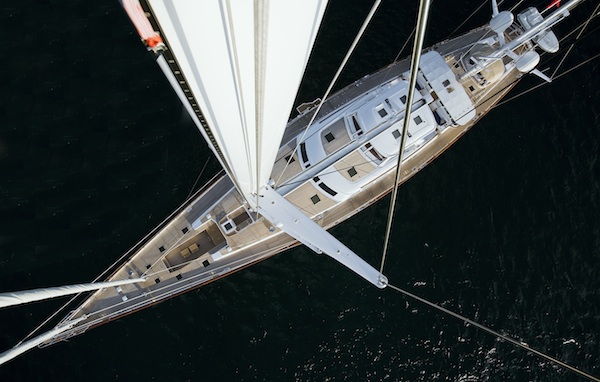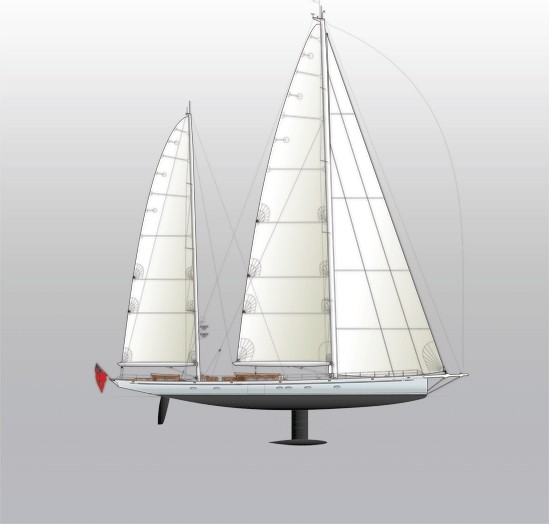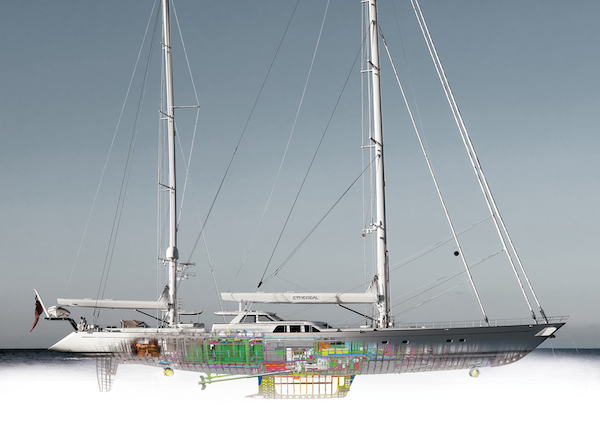Hybrid theory: what makes a hybrid yacht?
The recent launch of Feadship's first hybrid, 83.5m Savannah has thrown a light on the world of hybrid superyacht design, but confusion still surrounds what constitutes a hybrid yacht. SuperyachtDesign looks at the technology and yachts that have led the way.…
The recent launch of Feadship's first hybrid Savannah has thrown a light on the world of hybrid superyacht design, but confusion still surrounds what constitutes a hybrid yacht. What is hybrid technology, how new is it and how is it used in superyachts?
“There is so much confusion around what a hybrid yacht is and most people get it wrong,” says designer Rob Doyle. Bjorn Moonen of Ghost Yachts explains that, put simply, “a hybrid yacht is basically a yacht that can be propelled by two different energy sources. Most commonly these are a combination of diesel and electric propulsion systems”. The key difference between a straightforward diesel electric system and a hybrid system is the addition of a battery bank and the option to run on diesel, battery power or both at the same time. Savannah, for example, has a single diesel engine, three gensets and battery bank.
Hybrid technology in itself is nothing new. The history of diesel electric vessels goes back to the early 20th century and hybrid technology in automotive design is becoming increasingly common — the Toyota Prius being a prime example. In the superyacht industry, where the evolution of existing technology for implementation into superyacht design relies on a willing owner’s investment, it is less typical. Until now there has only been a handful hybrid superyachts launched or in production.
Arguably one of the first private yachts to be built using hybrid technology was S/Y Ethereal. Launched in 2008 by Bill and Shannon Joy the 58m Royal Huisman Ethereal featured a custom-built hybrid propulsion system and was designed to be as energy efficient as possible. With 500kW/h power storage capacity and the option of power recovery by using its propellers to generate electric power under sail, Ethereal was ground-breaking. “At that time a truly daring design because there was little usable certified standard equipment,” says Moonen. In an interview with our sister publication The Superyacht Owner, Joy confessed to assembling the hybrid system on the floor of the assembly hall at Royal Huisman. “We spent a couple years putting together custom bits that hadn’t been put together before and then debugged it before the launch of the yacht,” he said. Since then, the technology has become a little more off-the-shelf, but is still not common.
Another notable hybrid yacht launch was Royal Huisman’s 52m ketch Elfje in 2014. “Whereas Ethereal’s ground-breaking hybrid system focuses on propulsion and power management, Elfje interprets ‘hybrid' by supplying power via variable speed, variable output, variable fuel consuming generators backed up by a Li-ion ‘peak shaving’ power storage bank and energy management system,” says Royal Huisman's US representative and former captain of Whirlwind XII, Michael Koppstein.
According to Koppstein, in the case of both yacht owners, they knew from the outset that they wanted a way to balance energy generation, storage and use. Ethereal and Elfje use a fraction of the energy of comparable yachts. In contrast, as a motoryacht, Savannah offers fuel economies of 30 per cent due to her pioneering electro-mechanical propulsion platform that marries a dynamic hull shape with a very fine entry, uses one efficient medium-speed Wärtsilä main engine instead of two higher-rev diesel motors, two CPP's in a push and pull configuration (one propeller on the main shaft and the other on a pod behind it) and three genset.
The advantages of hybrid systems are clear. On both sailing and motoryachts, power can be managed more effectively, with fuel lasting longer, in turn allowing more self-sufficiency. “Reduced fuel consumption and emissions are often the most outspoken advantages, but for yachts the biggest benefits are the comfort benefits,” says Moonen. “If you look at a series hybrid with electric pods you get compact systems that give a lot of freedom in arrangement. This means that the generators can be placed in locations well isolated from guest areas. The motors in the pods are located outside of the hull and produce relatively low noise and hardly any vibrations.”
Both Koppstein and Moonen agree that the most commonly cited disadvantages of hybrid systems are the cost and complexity. “This argument isn’t really valid,” says Moonen. “Looking at current gross tonnage prices of new build projects indicates that in terms of costs hybrids are a valid option." He adds that complexity isn’t an issue unless you plan to redesign the whole system around your yacht.
So if going hybrid could save on running costs in the long run, make your yacht more environmentally friendly and more comfortable, why aren’t more owners building using this technology?
“Most clients just want a yacht, just like most of us want a normal car, but there are a few that want to push the envelope, like Bill Joy,” says Doyle.
Related Links:
Royal Huisman
Feadship
NEW: Sign up for SuperyachtNewsweek!
Get the latest weekly news, in-depth reports, intelligence, and strategic insights, delivered directly from The Superyacht Group's editors and market analysts.
Stay at the forefront of the superyacht industry with SuperyachtNewsweek
Click here to become part of The Superyacht Group community, and join us in our mission to make this industry accessible to all, and prosperous for the long-term. We are offering access to the superyacht industry’s most comprehensive and longstanding archive of business-critical information, as well as a comprehensive, real-time superyacht fleet database, for just £10 per month, because we are One Industry with One Mission. Sign up here.
NEW: Sign up for
SuperyachtNewsweek!
Get the latest weekly news, in-depth reports, intelligence, and strategic insights, delivered directly from The Superyacht Group's editors and market analysts.
Stay at the forefront of the superyacht industry with SuperyachtNewsweek






